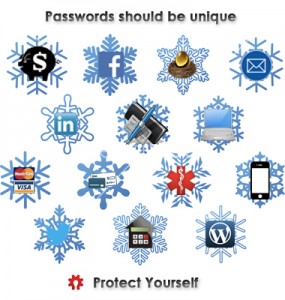If your pulse skipped a beat from Heartbleed, it’s understandable. This nasty software bug infected the “heartbeat” component of OpenSSL web security, which is supposed to protect us from theft on the web.
Many crooks took advantage of the situation. They flooded us with legitimate looking emails, prompting us to change different passwords. We hope you dodged these malicious links.
Some consumers have been proactive, feverishly changing their passwords all over the web. From online banking to social media networks, reconfiguring login credentials is no easy chore.
The worst part is, using the same password defeats the purpose. If you order pizza with the same credentials used to pay bills, consider yourself an easy target. Moreover if “password” is your default password, consider this the reason you were robbed.

Protect Yourself
Recalling unique passwords is no easy feat, but you should resist the pen-and-paper temptation. Unless you have an iron safe and plan on going nowhere, a physical list of logins is not an option. Anyone with a life and a smartphone needs this info, and a post-it note floating around your wallet is a gift to a pickpocket.
In a perfect world, passwords are like snowflakes; no two are alike. They should be mysterious, containing numbers, symbols, and letters in upper and lower case. Your name and birthday are too easy to guess, along with “1234” and anything obvious.
Assuming you are not Rain Man, recalling dozens of unique passwords is crazy. That’s why password management software has become so popular. It encrypts and automatically stores our logins to keep us sane and protected. Several solutions are free or cheap, and you only need to memorize one master password. Some also offer two-factor authentication, which further confirms your identity.
Solutions to Get Started
![]() LastPass offers exceptional protection for virtually zero effort. It lifts and encrypts logins stored in our browsers, while automatically disabling browser password memory. Available on PCs, Macs, and all major browsers, its security check tools evaluate current passwords and alert you of duplicates. It also checks for Heartbleed risks and provides safe access on other people’s computers. When used on desktops, LastPass is free. However, for a mere $12 annually, it extends to mobile devices and shared family access.
LastPass offers exceptional protection for virtually zero effort. It lifts and encrypts logins stored in our browsers, while automatically disabling browser password memory. Available on PCs, Macs, and all major browsers, its security check tools evaluate current passwords and alert you of duplicates. It also checks for Heartbleed risks and provides safe access on other people’s computers. When used on desktops, LastPass is free. However, for a mere $12 annually, it extends to mobile devices and shared family access.
![]() Dashlane is another fantastic solution that has a free desktop version. Like LastPass, it imports saved password data in browsers, and disconnects browsers’ password memory function. Its “digital wallet” feature stores your payment information so you don’t have to store credit cards on websites. It offers the same security tools as LastPass but will not work on Safari for Windows. Dashlane has a premium version that extends to mobile devices for an annual $30 investment. This is a reasonable price considering what it offers, and you can try it for a month free before buying it.
Dashlane is another fantastic solution that has a free desktop version. Like LastPass, it imports saved password data in browsers, and disconnects browsers’ password memory function. Its “digital wallet” feature stores your payment information so you don’t have to store credit cards on websites. It offers the same security tools as LastPass but will not work on Safari for Windows. Dashlane has a premium version that extends to mobile devices for an annual $30 investment. This is a reasonable price considering what it offers, and you can try it for a month free before buying it.
Honorable Mentions
While LastPass and DashLane are great for getting started, there are many other trustworthy options. Some password managers are 100% free including KeePass, SafeWallet and Norton Identity Safe. Others including RoboForm, Keeper, F-Secure, Password Box, and many others are moderately priced and worth exploring.
At the end of the end of the day, selecting a tool should be based on your personal preferences. We strongly recommend you give one a shot, as long as “password” isn’t your master password.